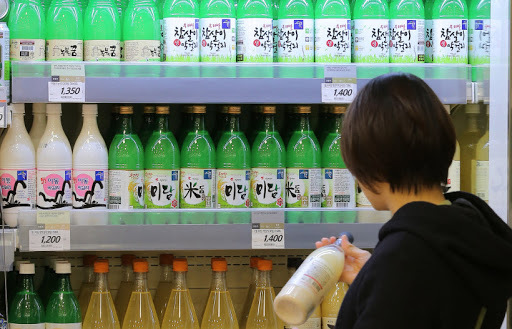S. Korea to drastically ease rules for stalled local liquor industry
Plans include delivery services of alcoholic drinks with food
By YonhapPublished : May 19, 2020 - 16:23

South Korea plans to alleviate liquor regulations to assist struggling manufacturers and distributors, officials said Tuesday.
The new rules, if approved by the National Assembly, will allow alcoholic drink companies to partly consign their production to original equipment manufacturers and also to produce non-alcoholic by-products at their facilities. When it comes to minor changes in products, the current approval process would be replaced by a simple reporting requirement for efficiency.
“(The government) plans to support the growth of the liquor industry through a series of additional deregulation measures in manufacturing, distribution and sales,” the Ministry of Economy and Finance and the National Tax Service said in a joint release.
Authorities also vowed to revise conventional regulations that are at odds with the actual consumer trend and market reality.
The key driver for fiscal authorities was the sluggish pace of growth in the domestic alcohol industry, especially compared with imported products.
While imported products saw their delivery volume soar by 24.4 percent from 2014 to 2018, domestic products only marked 2.5 percent growth during the same period, according to data by the NTS.
A major upcoming change is that liquor manufacturers will be allowed to freely outsource products to OEMs.
For example, a draft beer company that wished to add canned beer products could not outsource such production to another company due to licensing issues. The current regulations state that alcoholic product manufacturing licenses be issued for the manufacturing site, which means that a specific business unit may not outsource production to a separate facility.
Under the revised rules, however, such OEM production will be permitted as long as the consignee company holds the required license.
As for minor changes that do not affect the quality or safety of the given products -- such as small adjustments in ingredient combination percentage -- a simple report will do, without the current approval process.
The sale licensing process, which currently takes more than a month, will be shortened as authorities will run a two-track approval process for manufacturing procedures and liquor quality. The administrative move is expected to cut down the entire process by half to around two weeks, officials added.
Reflecting the contact-free culture amid COVID-19 and the consequent needs for home drinking, there have been calls that restrictions on alcoholic delivery should be eased.
As of now, online purchase and deliver is only allowed for traditional alcoholic drinks. Other types of alcoholic drinks may only be delivered on the sidelines of food -- for instance, bottled beer along with fried chicken.
This suggestion, however, was eventually rejected mostly due to concerns on underage drinking, a stance led by the Ministry of Health and Welfare and the Ministry of Gender Equality and Family.
These series of deregulatory revisions will be submitted and reviewed at this year’s regular parliamentary sessions so that the changes may be announced by the end of the year, according to the ministry.
“Unlike in the past, when liquor policies were mostly about supervising and collecting related taxes, it has now become important to promote the competitiveness of the industry in general,” the ministry said.
As of 2018, liquor tax accounted for a mere 0.9 percent of total national tax revenue, according to data compiled by the NTS. The corresponding figure has been on a steady decline over the past decades -- from 5.9 percent in 1970 to 5.5 percent in 1980, 3.8 percent in 1990, 2.4 percent in 2000 and 1.3 percent in 2010.
By Bae Hyun-jung (tellme@heraldcorp.com)







![[KH Explains] Hyundai's full hybrid edge to pay off amid slow transition to pure EVs](http://res.heraldm.com/phpwas/restmb_idxmake.php?idx=644&simg=/content/image/2024/04/18/20240418050645_0.jpg&u=20240419100350)







![[From the Scene] Monks, Buddhists hail return of remains of Buddhas](http://res.heraldm.com/phpwas/restmb_idxmake.php?idx=652&simg=/content/image/2024/04/19/20240419050617_0.jpg&u=20240419175937)

![[KH Explains] Hyundai's full hybrid edge to pay off amid slow transition to pure EVs](http://res.heraldm.com/phpwas/restmb_idxmake.php?idx=652&simg=/content/image/2024/04/18/20240418050645_0.jpg&u=20240419100350)

![[Today’s K-pop] Illit drops debut single remix](http://res.heraldm.com/phpwas/restmb_idxmake.php?idx=642&simg=/content/image/2024/04/19/20240419050612_0.jpg&u=)